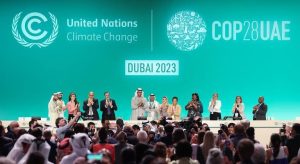The final agreement of the Dubai climate summit that mentions for the first time a transition “away from fossil fuels” is considered a step in the right path, but that remains far too insufficient to respond to the urgency and severity of the climate crisis, particularly for vulnerable countries

World leaders have finally agreed that the world must abandon fossil fuels to avoid catastrophic climate change, after 30 years of intense and painful negotiations.
This concession was obtained in the face of the outcry caused by the previous draft which did not explicitly recognise the need to move away from fossil fuels. The Global Stocktake, although hailed by some as “historic”, does not however evoke a clear “exit” from oil, gas and coal, that the global climate movement has been demanding for decades.
This small victory, however, marks the beginning of the end. Now world leaders have broken the taboo. The final text clearly names the evil, although it only calls for “transitioning away from fossil fuels in energy systems, in a fair, orderly and equitable manner, accelerating action in this decade crucial, in order to achieve carbon neutrality in 2050 in accordance with scientific recommendations.”
The end of the age of fossils is fast approaching. A scenario that would not have been possible had it not been for the global climate movement and communities that have spoken loud and clear over the past few weeks and during COP.
Should we then rejoice in the results of this conference? Not really. As an African, we expected COP28 to demonstrate commitment to course correcting and charting a path to a complete phase out of all fossil fuels, a sustainable future built on renewables, ambitious adaptation finance and clear technology transfer commitments by rich nations.
Though the Dubai final text mentions the transition away from fossil fuels, it makes no reference to the support needed for developing countries to undertake this energy transition. Who will pay the bill for this transition? Is it fair and realistic to expect developing countries to bear the burden of this transition without significant financial support?
Financing issues have been for long at the heart of climate negotiations and have caused enormous frustration for African countries who adopted the Nairobi Declaration last September, a text sanctioning the first African Climate Summit. The continent which is bearing the brunt of the ravages of the climate crisis, is calling for an increase in “Africa’s renewable energy production capacity from 56 gigawatts in 2022 to at least 300 gigawatts by 2030”, as well as an in-depth reform of a new financing mechanism adapted to the needs of Africa, including restructuring and debt relief. This objective was not achieved in Dubai.
No one needs to recall the continent’s insignificant contribution to the ongoing crisis; hence the final text leaves a bitter taste from a climate justice perspective. For millions of Africans, the climate crisis affects every aspect of life – from food and housing to access to clean water and clean energy. Hence support for the tripling of renewable energies had generated optimism and energised communities who have mobilised massively in recent weeks to call for rapid and large-scale deployment of renewable energies in Africa.
To truly achieve climate justice, the biggest polluters must take leadership and do their part to phase out all fossil fuels while accelerating funding to triple clean energy by 2030 and doubling of energy efficiency. These two objectives are closely linked and represent the only path to survival for the populations of the Global South. Once again, the Dubia agreement failed to present a clear path forward, supported by a legal framework and implementation timetable.
History will remember that COP28 was a moment of truth for the fossil fuel industry, after decades of lies, manipulation and greenwashing. We were not expecting that the end of the fossil fuel era would be declared by its first beneficiaries.
There were at least 2,456 fossil fuel lobbyists at this summit who did everything to influence the final agreement. Until the last hour of the COP, we have also seen the power of mobilisation and pressure from civil society, the climate movement, indigenous peoples and progressive leaders who demonstrated their commitment to protect the interests and the future of the most vulnerable and the voiceless at the center of climate negotiations.
Over the next two years leading up to COP30 in Brazil, we will continue to build momentum to demand climate justice even more fiercely. A luta continua!
By Landry Ninteretse, Regional Director, 350Africa.org
